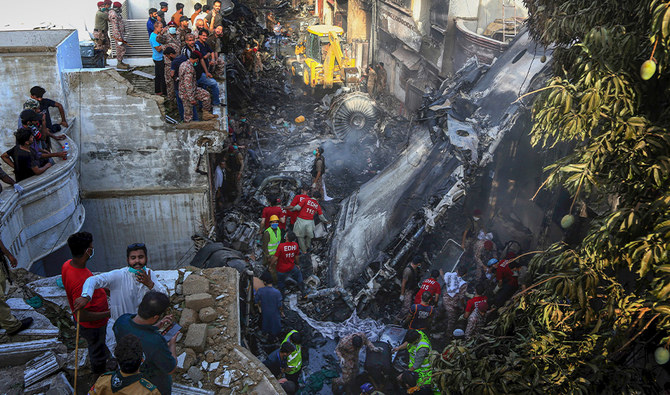ISLAMABAD/KARACHI: A 16-year-old A320 Airbus flying from Lahore to Pakistan’s financial hub of Karachi plunged into a residential area near the Karachi airport on Friday, killing 97 of 99 people on board, a spokesperson for the provincial health department said early Saturday morning.
In a Twitter post, Sindh health department media coordinator Meeran Yousuf said only two passengers on board the Pakistan International Airlines 8303 flight had survived, adding that 66 bodies had been taken to Jinnah Postgraduate Medical Center and 31 to Civil Hospital Karachi. Only 19 bodies had been identified thus far, Yousuf said.
Murtaza Wahab, a spokesman for the Sindh government, said DNA would be needed to identify the victims, urging family members to come forward and provide samples.
A notification from the Aviation Division seen by Arab News said a special team had been formed by the federal government to investigate the incident and was required to furnish a preliminary statement within a month and a full report in the “shortest possible time.”
Ghulam Rasool Khosa, a spokesman for the Civil Aviation Authority, told Arab News two people had survived the jet crash but declined further details.
“Those injured on board and due to crash went to different hospitals so it is hard to identify who is a surviving passenger,” Saeed Ghani, a senior minister in the Sindh cabinet, told Arab News. “But two people who we could talk to [and who are alive] have confirmed to us that they were on board.”

In this photo released by the Sindh Press Information Department, Pakistani provincial minister Saeed Ghani, second from right, meets Mohammad Zubair who survived a plane crash, at a hospital in Karachi, Pakistan, Friday, May 22, 2020. An aviation official says a passenger plane belonging to state-run Pakistan International Airlines carrying passengers and crew has crashed near the southern port city of Karachi. ((Sind Press Information Department, via AP)
Pakistan resumed domestic flights just this week after shutting them down in March amid the coronavirus pandemic. Most of the passengers on the PK8303 flight were flying home to meet their families over the Eid Al-Fitr holiday after over two months in lockdown.
“The plane … took off from Lahore airport at 1.00 p.m. and approached Karachi airport at the scheduled time,” Abdul Sattar Khokhar, senior joint secretary at the Aviation Division, told Arab News. “The pilot made a mayday call at 2.39 p.m. and the plane crashed at the same time in a residential area close to the airport.”
Khokhar said it would be “premature” to comment on the reasons that caused the jet to crash but said a committee headed by Air Commodore Usman Ghani had been set up to investigate the matter.
Pakistan Prime Minister issued a Twitter statement expressing condolences to the families of those who died, saying: “Shocked & saddened by the PIA crash. Am in touch with PIA CEO Arshad Malik, who has left for Karachi & with the rescue & relief teams on ground as this is the priority right now. Immediate inquiry will be instituted.”
Rescue officials said they initially faced difficulty in reaching the crash site because of the area’s congested streets and the presence of huge crowds of people who had gathered in the neighborhood. But police officers and soldiers from the Pakistan Army’s Quick Reaction Force and the paramilitary Rangers quickly dispersed crowds and cordoned off the locality, allowing rescue officials to fight through thick smoke and flames to find survivors amid the wreckage.
Pakistani news television channels showed buildings and cars on fire at the site of the crash, and charred bodies being pulled out from the mangled fuselage. Firefighters and Edhi Foundation volunteers could be seen hosing down the debris of the plane and surrounding buildings that had caught fire.
Devastated family members mourned and wailed at the airport and near the crash area, trying to find out if their relatives had survived.
Witnesses reported the plane plummeting down, and said its rear end hit the ground first.
Muhammad Adil, a resident of Malir area’s Model Colony, said he was offering Friday prayers at a nearby mosque when he heard a huge blast.
“I ran to the street and saw the plane had crashed after damaging most of the houses,” Adil told Arab News, describing parts of the plane strewn across the neighborhood. “I couldn’t see the injured and the dead as law enforcement agencies pushed us from the area and cordoned it.”
Footage on Pakistan’s Geo News showed rescue officials pulling Zafar Masud, the CEO of the Bank of Punjab, out of the wreckage alive. A spokesperson for Sindh chief minister Murad Ali Shah confirmed that Masud was recovering at a Karachi hospital.
A top Pakistani model, Zara Abid, was also confirmed to be on the flight. Her last post on the popular photo-sharing site Instagram, from three days ago, showed her inside a small plane, with the caption: “Fly high, it’s good.”
Pakistan’s Geo News reported that a part of the plane’s black box, the quick access recorder, had been recovered and handed over to Civil Aviation Authority officials. The recorder provides raw flight data and a record of conversations held in the cockpit.
Friday’s air crash brought back memories of the last major plane crash in Pakistan, in 2016, when a plane carrying 47 people crashed into a mountain in northern Pakistan.
In 2010, a 10-year-old Airbus A321 operated by the then relatively new Pakistani airline, Airblue, crashed in fog and intense rain in the Himalayan foothills near Islamabad, killing all 152 people on board in the country’s deadliest domestic plane crash.
In July 2006, a Pakistan International Airlines flight crashed shortly after takeoff in the eastern city of Multan, killing all 45 people aboard, including two judges from the Lahore High Court, two brigadier generals of the Pakistani Army and a university vice chancellor.
Right before Friday’s crash, the pilot of the jet sent a Mayday and told controllers the aircraft had lost power from both its engines on its second attempt to land, Reuters reported, quoting monitoring website liveatc.net
Listen to Live ATC (Air Traffic Control) Communications | LiveATC.net
LiveATC.Net provides live air traffic control (ATC) broadcasts from air traffic control towers and radar facilities around the world
liveatc.net, a respected source for in-flight recordings.
“Sir, we are proceeding back. We have lost engines,” the pilot said in the recording.
After the control tower told the pilot he was clear to land, the reply came: “mayday, mayday.”
After the crash, questions and criticism immediately surfaced about the quality and maintenance of the aging airplanes used by PIA, the country’s main carrier.
Senior pilot and spokesman of the Pakistan Airline Pilots Association, Tariq Yahya, said he and his colleagues had feared such an accident was on the cards as many PIA planes had outlived their age.
“In the end it seems there was no power in the plane,” Yahya said. “The plane was gliding along and couldn’t make it to the runway … It crashed very short of the runway, which is so unfortunate.”
To inquire about the plane crash or passenger details, the government has supplied the following phone numbers: 02199242284, 02199043766, 02199043833.
Aamir Saeed contributed reporting from Islamabad

















